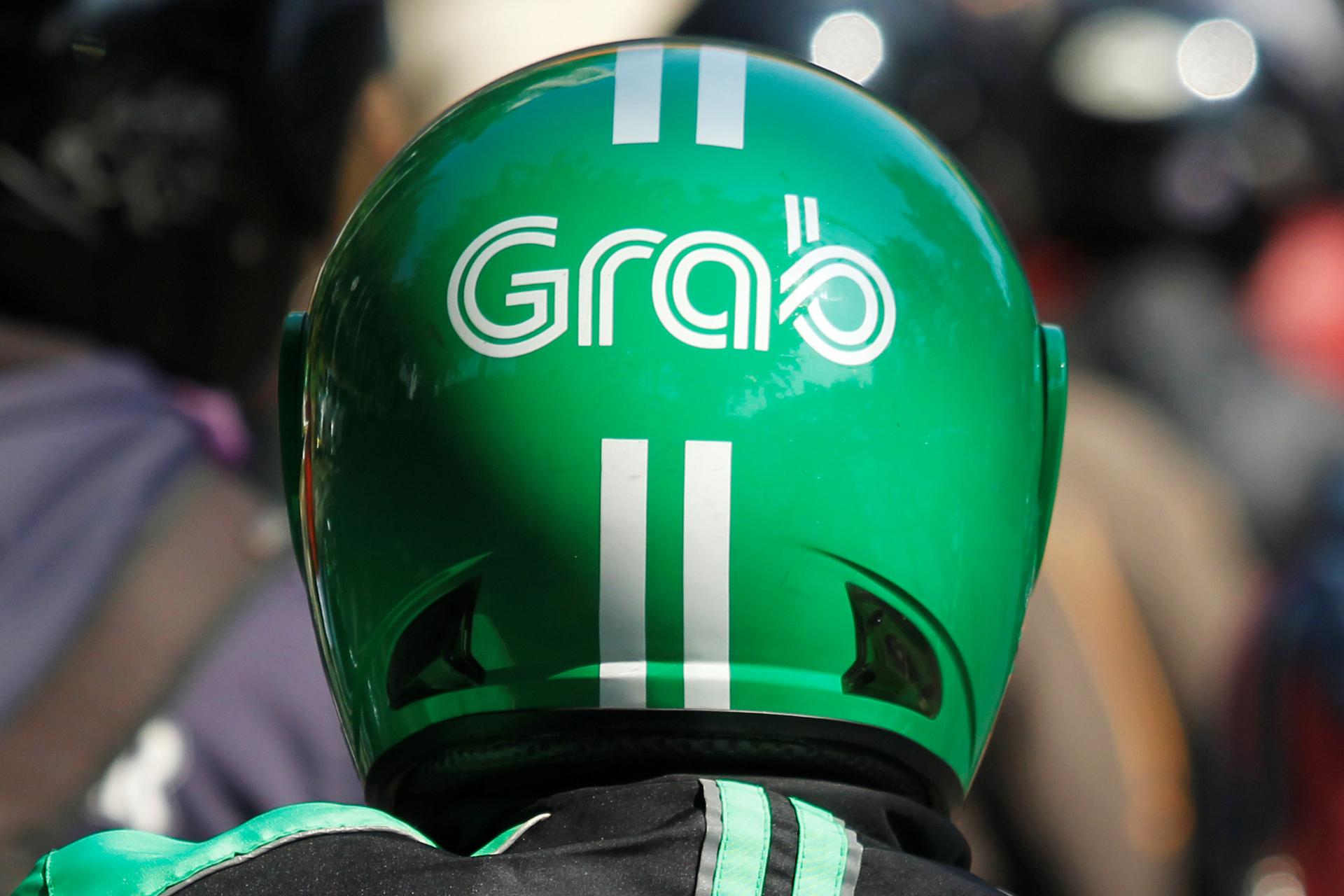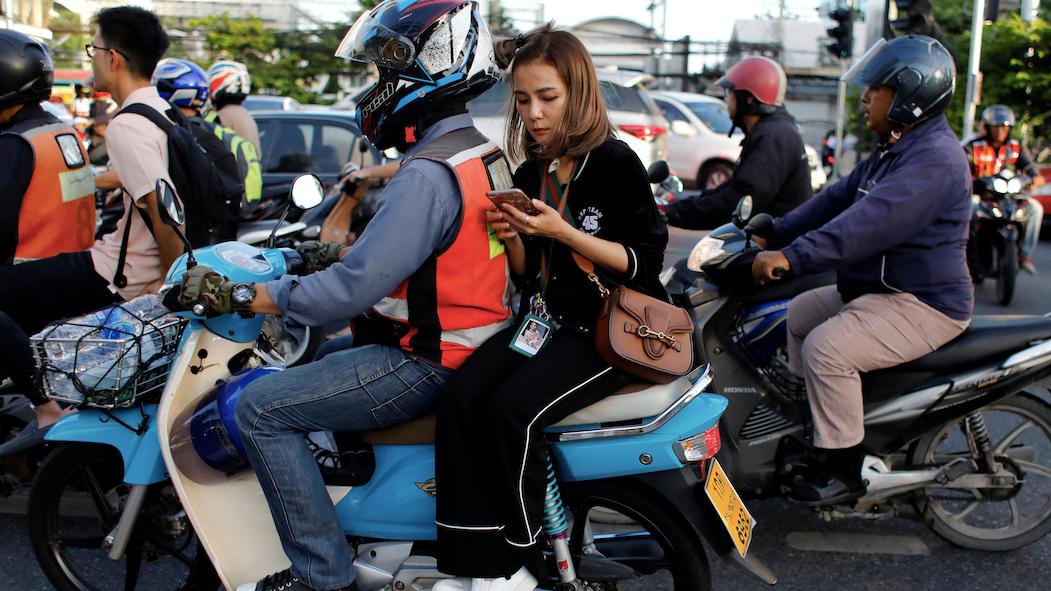This app is disrupting motorbike taxis in Bangkok. Some are disrupting right back.
A woman uses her mobile phone while riding a motorbike during rush hour in Bangkok, June 16, 2017.
In the Thai capital, roads are often so hopelessly clogged that only a motorbike can get you to your destination on time. A motorbike, unlike a car, can weave between idling vehicles. Or even mount the sidewalk.
On every major corner in Bangkok, there’s a motorbike taxi crew that, for a modest payment, will zip you to your destination by any means necessary. The men and women who ferry passengers through the city’s hellish traffic are prideful — and for good reason.
They must earn their peers’ respect by surviving inevitable road scrapes. They give back to the neighborhood by keeping a wary eye out for creeps and purse snatchers. They are as essential to the streetscape as noodle carts and, for decades, they have largely run the streets unchallenged.
But their dominance is now threatened by an app.
It’s called Grab. Like Uber, it’s primarily a ride-sharing app. You pull it up on your phone to summon things: a taxi to the airport or a bucket of fried chicken. It is advertised as a godsend in crowded cities where “poorly planned, inefficient transport systems” cause “pain for their citizens.”
Related: In Argentina, Uber is ‘illegal’ but unemployment is rampant
These days, it can also bring you a motorbike driver. At the push of a button, a feature called GrabBike conjures up someone on a scooter. They pull up, you hop on back and zip away.

Many motorbike taxi crews — irate at seeing rivals rolling through their turf — can’t stand it.
“You’re asking if it makes us angry? Hell, yes, we’re angry! You wouldn’t be angry if it were you? They’re stealing our jobs.”
“You’re asking if it makes us angry? Hell, yes, we’re angry!” said Nopphadon Phooreerot, a 30-year veteran motorbike taxi driver who works in Bangkok. “You wouldn’t be angry if it were you? They’re stealing our jobs.”
Grab is enormously popular in Southeast Asia. The creators of Grab are two Malaysian entrepreneurs who both went to Harvard University in Massachusetts: Anthony Tan, son of a family that owns an auto conglomerate, and Tan Hooi Ling, formerly with the McKinsey & Company consultancy.
Introducing Uber-style technology to Asia has brought them great success — but also a small measure of infamy, at least within the gruff subculture of motorbike taxi crews working the streets from Bangkok to Jakarta to Hanoi.
To legally work as a motorbike taxi driver in Thailand, you must go through a bureaucratic gauntlet: pass a litany of tests, shell out cash for an official permit and secure a vest (usually colored bright orange) that bears your official registration number.
But GrabBike seems to exist in a legal gray zone, allowing bike drivers to skip that ordeal. Imagine how they feel when some outsider on a motorbike comes along — with no crew, no street cred, whisking away passengers from their hard-won turf. Some drivers are tempted to pounce.
Related: Taxi drivers in Seoul stage mass protest of carpooling app
“It goes down like this,” said a motorbike taxi veteran, who only gave his name as Len. He’s in his 40s and works off Sukhumvit Road, one of Bangkok’s main drags.
“We speak to them sweetly at first,” Len said. “And if that doesn’t work, well, maybe they get a little violent. And we can get violent, too, and settle it right there.”
“Most GrabBike guys end up running away — or trying to, at least. They know they’re in the wrong.”
“We’ve got the numbers,” he said. A motorbike taxi crew, at any given time, fields five to 20 drivers lined up by the roadside. “Most GrabBike guys end up running away — or trying to, at least. They know they’re in the wrong.”

Tech CEOs often portray themselves as a force for good, unleashing technology that unites far-flung people, challenges bloated monopolies and empowers the masses.
But their technology’s proliferation across Asia is also marked by unintended consequences. In Myanmar, vile speech on Facebook has stoked real-life mob violence against Muslims. In China, a banal tweet can bring the cops to your door.
Grab is also a massive convenience to many. But any frequent viewer of the evening news in Thailand may have seen shaky cellphone video of GrabBike drivers getting accosted — and in very rare cases, stabbed. Footage of motorbike crews harassing GrabBike drivers has become a recurring segment on news programs.
Related: Is the e-bike revolution ready to come to America?
Meanwhile, Grab is promoting its GrabBike service heavily. The company has rolled out a jingle, sung by a megafamous teen girl group, BNK48, telling customers that “GrabBike is a friend by your side/ No matter how bad the traffic, you need not freak out.”
But motorbike taxi drivers, united through various trade associations, keep trying to counter GrabBike’s success with their own rallies. At a September protest against Grab, which rallied hundreds of drivers in Bangkok, crowds roared when a speaker shouted: “Brother and sisters, wouldn’t we all like to see someone ‘grab’ the owners of this company?”
This is a bit less menacing than it sounds. In Thai, the word for “grab” and “arrest” is the same — and this was likely meant to urge police to detain Grab’s corporate leaders for skirting labor laws. (The World reached out to Grab for comment but did not receive a reply.)
But if that statement was at all unclear, other rallies held by motorbike taxi clubs have sounded even more combative. At a gathering last year in Bangkok, protesters burned a bright-orange vest — symbolizing the death of their livelihood at the hands of this foreign corporation.
They also unveiled a funereal wreath bedecked with white flowers fit for a somber burial.
The wreath bore the name Anthony Tan, the CEO of Grab.
